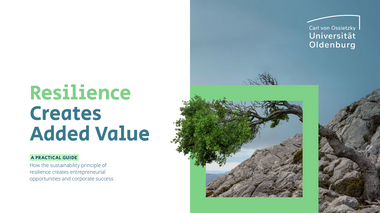Resilience as an opportunity for sustainable corporate action
Resilience as an opportunity for sustainable corporate action
Resilience Creates Added Value - A Practical Guide
The idea of resilience as a service for others ("Resilience-as-a-Service") stimulates new perspectives, opens up entrepreneurial opportunities and creates added value for society. This practical guide is therefore entitled "Resilience as added value".
It is aimed at companies, startups, business associations and funding agencies that want to know what resilience "can do" beyond risk management. This guide introduces the concept of opportunity-oriented resilience and explains how the opportunity perspective can be successfully used for sustainable corporate action, based on company examples and four key corporate task areas (strategic management, sustainability management, innovation management and business model development). In this context, resilience is understood as a fourth sustainability principle that complements the principles of efficiency, consistency and sufficiency.
To download the guide, click on the thumbnail or here.
Knowledge bases for entrepreneurial practice
The concept of resilience, which rose to prominence with the Corona pandemic, is anything but new and has its origins in scientific work on evolutionary psychology in the 1950s. Resilience concepts are used in psychology, ecosystem and organisational research, among others, and in more recent years have been applied in the context of other scientific disciplines, such as research on climate change adaptation. Resilience concepts are also taken up in individual areas of corporate practice, but mainly in the field of risk management and risk defence.
If resilience is understood as a design-oriented guiding concept for the development of supply and product-service systems that are resilient to disruptions and surprises and that contribute to a sustainability-oriented transformation of the economy, then the question for innovation-oriented companies arises:
How can products and services be developed and offered that increase the resilience and sustainability of customers and their organisations and thus create sustainable added value?
Resilience is no longer understood as merely risk-focused, but as an opportunity- and transformation-oriented approach.
So far, resilience has hardly been taken up in the discourse on corporate sustainability. Yet resilience can be understood as another central sustainability principle (avoidance of system collapse, maintenance of basic functions under stress and massive disruptions) and can complement the principles of (resource) efficiency, consistency and sufficiency, which have been in focus so far, in an important way.
In this project the idea and principle of resilience will be systematically linked to the sustainability discourse and anchored in a enhanced understanding of innovation.
Objectives of the field of action analysis are:
- to elaborate the significance of the resilience concept for future-oriented, sustainable corporate action,
- to identify existing gaps in sustainability strategies, management literature and corporate practice,
- to develop concrete starting points on how companies can be strengthened in their sustainability through the use of the resilience concept and develop innovative products and services for resilient systems,
- to identify the needs for promotion and support of the target group of enterprises/SMEs,
- to develop target group-oriented practical methods and handouts that companies can use in their sustainability, climate and innovation management, and
- to create a matrix with resilience-related needs, starting points and thematic fields for business-related funding institutions.

